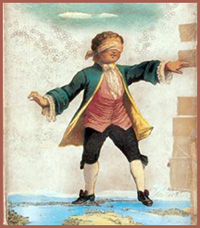Patriot Act's National Security Letters: We Ask, Don't Tell genre: Polispeak

With the passage of the Patriot Act, the potential for the government to abuse its newfound authority to snoop on its citizens was expanded. Unfortunately, along with that expansion came the ability to prevent those who contest such inquiries...and succeed...from discussing the details of the case in question.
Hence, the FBI and other agencies have no deterrent to pushing the limits of their authority. In fact, recent successes in preventing such inquiries have all been met with the same strategy...a sudden withdrawal of the request accompanied by a gag order on the party served.
The Internet Archive, a project to create a digital library of the web for posterity, successfully fought a secret government Patriot Act order for records about one of its patrons and won the right to make the order public, civil liberties groups announced Wednesday morning.
On November 26, 2007, the FBI served a controversial National Security Letter on the Internet Archive's founder Brewster Kahle, asking for records about one of the library's registered users, asking for the user's name, address and activity on the site.
The Electronic Frontier Foundation, the Internet Archive's lawyers, fought the NSL, challenging its constitutionality in a December 14 complaint to a federal court in San Francisco. The FBI agreed on April 21 to withdraw the letter and unseal the court case, making some of the documents available to the public.
The Patriot Act greatly expanded the reach of NSLs, which are subpoenas for documents such as billing records and telephone records that the FBI can issue in terrorism investigations without a judge's approval. Nearly all NSLs come with gag orders forbidding the recipient from ever speaking of the subpoena, except to a lawyer.
Brewster Kahle called the gag order "horrendous," saying he couldn't talk about the case with his board members, wife or staff, but said that his stand was part of a time-honored tradition of librarians protecting the rights of their patrons.
Though FBI guidelines on using NSLs warned of overusing them, two Congressionally ordered audits revealed that the FBI had issued hundreds of illegal requests for student health records, telephone records and credit reports. The reports also found that the FBI had issued hundreds of thousands of NSLs since 2001, but failed to track their use. In a letter to Congress last week, the FBI admitted it can only estimate how many NSLs it has issued.
The Internet Archive's case is only the third known court challenge to an NSL, all of which ended with the FBI rescinding the NSL, according to the ACLU's Melissa Goodman.
"That makes you wonder about the the hundreds of thousands of NSLs that haven't been challenged," Goodman said, suggesting that the FBI had collected sensitive information on innocent Americans.
The settlement with the government puts an end to that challenge and still keeps Kahle and his lawers from discussing -- even in the most general terms -- what the FBI was after and what public information the Internet Archive turned over to the FBI. For instance, the lawyers declined to say what kind of information the target was looking at or uploading -- such as animal rights information or Muslim literature.
[...] The Internet Archive case is only the second time the courts allowed the recipient of a Patriot Act National Security Letter to reveal his or her identity.
The history of such efforts to surveil Americans was altered in the aftermath of the Nixon presidency and the events surrounding Watergate. At the time, the ability of the government to conduct such operations was curtailed and virtually eliminated. With 9/11 and the passage of the Patriot Act, the floodgates of federal snooping were reopened...and the evidence suggests that some of the same abuses that facilitated the ban in the past have reemerged under the new guidelines.
Unfortunately, the latest foray allows the government to silence those who may have been compelled to participate in committing the abuse. Under the auspices of national security, questionable activity isn't allowed to reach the public's view - thereby preventing any of the accountability that would naturally be driven by public outrage with any revealed improprieties.
A program of this nature, when coupled with an administration that is prone to misguiding voters and utilizing the mechanisms of government for political advantage, has the potential to trigger abuses that far exceed those committed under the Nixon administration.
With George Bush's disapproval numbers surpassing those of all the presidencies previously measured, one can't help but wonder if the unknown abuses also exceed those of his predecessors...especially those of Richard Nixon...who found himself in the unenviable position of being forced to make an early exit from the White House.
9/11 was a defining moment in American history. Sadly, we may never know the degree to which the current administration used it to restrict and/or remove our civil liberties. That possibility makes it difficult to endorse the efforts George Bush tells us are designed to protect our way of life from the terrorists. Preserving freedom and liberty at the expense of both should never be optional.
Tagged as: 9/11, Brewster Kahle, Civil Liberties, Electronic Frontier Foundation, FBI, George Bush, Internet Archive, National Security Letters, NSA, Patriot Act, Richard Nixon
Trackback Pings
Listed below are links to weblogs that reference Patriot Act's National Security Letters: We Ask, Don't Tell:
» Patriot Act’s National Security Letters: We Ask, Don’t Tell from www.buzzflash.net
On the surface, the Patriot Act sounds like a noble undertaking. Unfortunately, the use of the act to enable domestic surveillance absent oversight seems rather contrary to its title. Exposing improprieties is even more restrictive. Perhaps the plan ou... [Read More]
Tracked on May 7, 2008 5:30 PM
© Copyright 2024
Post a comment